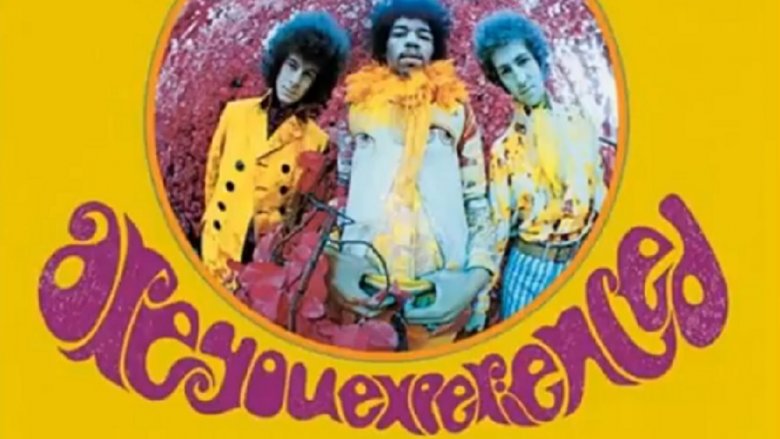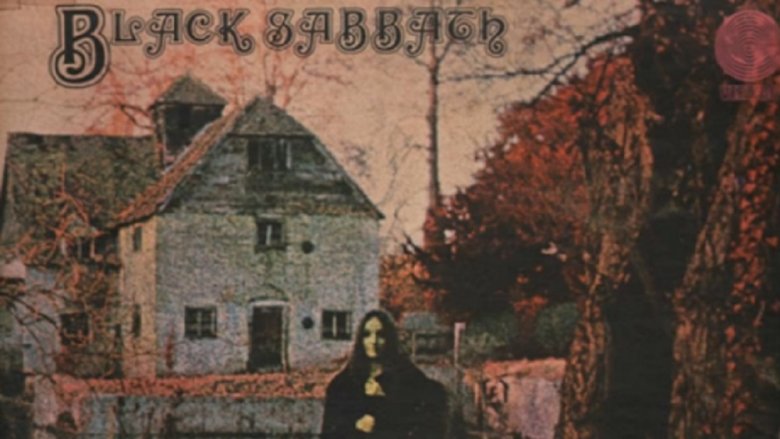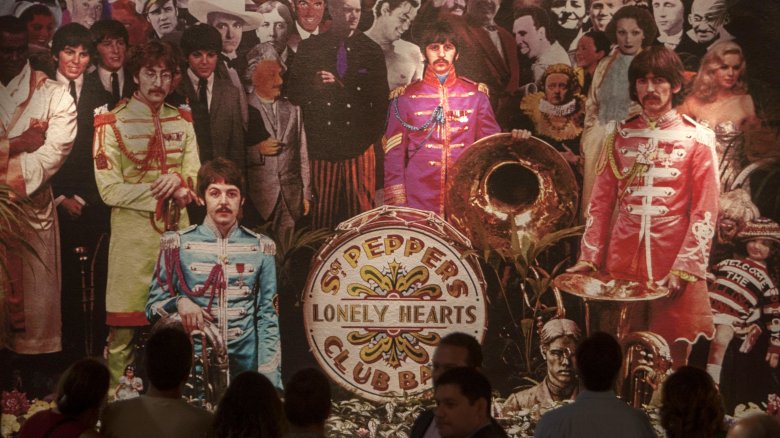The Most Brutal Music Reviews Of All Time
Being a critic of any kind can be a thankless job, but music reviewers may have it toughest of all. Not only is music highly subjective, but a lot of fans' identities are pretty strongly tied to the music they listen to, and some stuffed shirt telling fans that their favorite band's new album sucks has a way of feeling like a personal attack. Of course, no recording is going to rub everyone on Earth exactly the right way, and even classic albums are bound to draw a negative notice or two — music speaks to different people in different ways. Totally understandable!
However, some critics take this a bit far. Like these ones, for instance, who heaped scorn on the following releases like Roger Ebert an hour after getting his car booted while putting down his favorite dog. Some of these releases are beloved by millions, some are borderline practical jokes, and at least one is literally shorthand for "greatest album of all time" — but the critics who penned these reviews took off the kid gloves, put on the boxing gloves, and pounded their subjects right through the floor.
Play with fire ... and get burned
Not one single person on Earth expected Kevin Federline's debut "rap" album to be even the teensiest bit good. (Except for maybe Federline himself.) Back in 2006, ol' K-Fed was known for being married to Britney Spears, having the most punchable face in America, and walking around with a maddeningly unearned air of entitlement, in that order. When Playing with Fire was released to blazing-hot sales of 6,485 copies, Federline instantly cemented his status as a punchline with a rap style that could charitably be called "uneven" (or not-so-charitably be called "ultra-wack"), and critics got their knives out.
One, however, had a knife quite a bit longer, sharper, and funnier than the others. IGN's Spence D. littered his review with punchlines far funnier than anything K-Fed could dream up in a dozen lifetimes while excoriating every aspect of the record: "When he utters 'It's the moment y'all anticipated' ... one seriously has to wonder whom he is referring to ... at least give it up to the Federline for being tenacious and following his dream, no matter how delusional it may have been." He goes on to criticize Federline's "sluggish" flow, the generic production and Spears' bizarre cameo, before winding up for the big one: "The fact that his friends, family, and close associates stood by while he locked himself away in the studio when they very easily could have stepped in and provided some artistic intervention is just shy of being truly criminal."
A pretty crappy Experience
Nobody in their right mind would dispute the fact that Jimi Hendrix is one of the greatest rock guitarists who ever lived. Similarly, few critics would disagree that his tight three-piece band — which included bassist Noel Redding and drummer Mitch Mitchell, one of the most well-regarded skin-pounders of the time not named Moon or Bonham — was a super-crack unit. Rolling Stone's Jon Landau acknowledged all of this in his 1967 review of the band's debut Are You Experienced? Landau's issue was with the quality of Jimi's vocals and lyrics. In his humble opinion, it sucked eggs.
"Prior to his guitar solo on ['Red House']," he wrote, "Jimi Hendrix announces, 'I've still got my guitar.' It's a good thing, because Jimi is neither a great songwriter nor an extraordinary vocalist." He goes on to dole out praise to all the band members for their virtuosity as well as Jimi's skills as an arranger, before calling the whole project "insane." It was "simply a matter of either you dig it or you don't. Basically, I don't for several reasons. Despite Jimi's musical brilliance and the group's total precision, the poor quality of the songs and the inanity of the lyrics too often get in the way. ... Dig it if you can, but as for me, I'd rather hear Jimi play the blues."
Doesn't get much poorer than Fortune
Chris Brown's 2012 release Fortune was a bit divisive. On the one hand, you had fans still enamored of his swaggering presence and vocal style, and on the other you had people who quite reasonably felt that his celebrity card should have been permanently revoked after his brutal pummeling of then-girlfriend Rhianna three years earlier. Fortune wasn't a great record by any stretch, but some critics who resided in the latter camp — like X-Press magazine's Chloe Papas — viewed it with the kind of contempt usually reserved for ... well, people who beat women.
"A repugnant record that we can only hope will be his last," she wrote, probably with steam venting from her ears. "The whole album ... has two themes: unprotected sex is super fun and partying is cool ... a catastrophic clusterf*ck of an album that shouldn't appeal to anybody with ears. Or morals." Papas briefly panned the album's "generic, overly auto-tuned, commercialized R&B" but was obviously offended not so much by the the project's ineptitude as by Brown's continued existence, which she totally owned up to. "Regardless of whether Chris Brown has any musical talent (he doesn't) or whether this album is any good (it isn't), the man recently brutally assaulted a woman ... which is, frankly, disgusting," she opined. She closed her review by chastising Brown's fans for encouraging him before awarding her star rating: "NO STARS EVER."
Critic needs to pick up the mic
"Tyga is the guy in your group of friends who no one particularly likes but is always just kind of there," wrote Pitchfork's Meaghan Garvey in opening her review of the rapper's fourth album, 2015's The Gold Album: The 18th Dynasty. This shot across the bow set the stage for a few more shots, followed by prolonged bursts of machine gun fire, followed by a bunker-buster and, for good measure, a couple nuclear warheads. Nobody would argue that Tyga is a supremely gifted lyricist, but Garvey seemed determined to illustrate his incompetence by contrasting it with diss after hilarious diss of the sort that would put the most hardened battle rapper to shame.
Commenting on Tyga's self-directed video for "40 Mill," she refers to him as "M. Night Strugglerap." She breezily dismisses the entire album as "microwave-nuked approximations of Drake songs circa 2013 and Kanye ... with none of the wit, soul, or edge," while drilling Tyga for delivering his bars "with all the force of a clammy, limp handshake." She was just warming up. "Tyga couldn't string two coherent lines together to save his life: each bar is a dead end, completely unrelated to the one that came before it," she observed, before bringing it home: "[He] raps like his bars are transcribed on the insides of fortune cookies that he must break open individually." We could take or leave Tyga, but now we just want the debut album from Meaghan Garvey.
An undercooked Cream pie
Legendary Rolling Stone critic Lester Bangs opened his review of the equally legendary Black Sabbath's self-titled debut by musing on the continued influence of Cream, the prototypical power trio fronted by guitar god Eric Clapton. Although they'd been broken up for two years, he had observed "a whole raft of studious imitators" vying to take their place, and left no room for doubt regarding his opinion of Ozzy and the gang: "Over across the tracks in the industrial side of Cream country," he wrote, "lie unskilled laborers like Black Sabbath."
Bangs took issue with every single aspect of the album's sonic palette, from the "murky songtitles and inane lyrics that sound like Vanilla Fudge paying doggerel tribute to Aleister Crowley" to the "plodding bass lines over which the lead guitar dribbles wooden Claptonisms from the master's tiredest Cream days." There was literally not one single thing about Black Sabbath — an undisputed classic record that pretty much invented heavy metal — which Bangs deemed worthy of praise. Instead, he found it to be a rote Cream imitation infused with "ritual celebration of the Satanic mass or some such claptrap," a notion he hammered home with his parting shot: "They even have discordant jams with bass and guitar reeling like velocitized speedfreaks all over each other's musical perimeters yet never quite finding synch — just like Cream! But worse."
Man of the Woods, record of the trash
As a performer, Justin Timberlake is the closest thing this generation has to a Michael Jackson. He's a great singer and dancer, and is known for taking chances with his music (with somewhat mixed results) in a way few pop artists do. For his latest trick, however, he managed to baffle pretty much everybody with the country-tinged Man of the Woods, a title that before now was probably the exact last combination of words that would pop into anybody's head when thinking of Timberlake. The general critical reaction could best be described as "puzzled" — except over at Pitchfork, where reviewer Jamieson Cox did not hesitate to rip the record a new one.
Dubbing it "a misstep large enough to merit relitigating Justin Timberlake's status as a pop superstar," Cox lambastes the album's lazy production (from familiar Timberlake cohorts such as the Neptunes and Timbaland, as well as Timberlake himself) as well as its thematic shallowness, succinctly calling it "a mile wide and an inch deep." But he reserves his biggest burn for the lyrics, calling Timberlake an "abjectly poor" lyricist prone to dropping clunkers that "engender the same mix of emotions you'd confront upon walking in on your parents having sex." He closed by noting that despite being at the center of numerous controversies, none of them have slowed Timberlake's rise, and that "when you skate through your life unscathed, you accumulate hubris. And it takes a lot of hubris to make an album like Man of the Woods."
More like dumpster fire
Now hear this: Washington Post's Chris Richards really, really hates Arcade Fire. The indie-rock darlings won an Album of the Year Grammy in 2011, but to Richards, they don't register so much as a rock band as "gigantic dorks with boring sex lives" — and by the end of his review of the band's 2013 outing Reflektor, he had taken them apart so completely that even some of their staunchest fans might have found themselves nodding involuntarily in agreement.
"They're still the biggest rock band on the block, still making music mysteriously devoid of wit, subtlety and danger. And now, they're really into bongo drums, too. We should all be repulsed. Only partially because of the bongos," he wrote. Accusing the band of strip-mining influences such as Talking Heads and David Bowie to appeal to the pleasure centers of rock fans, he asserts that the "bludgeoning and vacant" record "both condescends and sells itself short, over and over again, for 76 insufferable minutes." He reserved plenty of scorn for front man Win Butler's "dreadful" lyricism and producer James Murphy (formerly of LCD Soundsystem), "whose good taste has now been thrown in question." But his final thoughts seem like they should have made every existing copy of the record crumble to dust: "It's something conservative pretending to be something bold. ... It's an album with a song called 'Porno' that you could play for your parents. It's fraud."
Queen of purposelessness
Katy Perry has always been an unapologetic purveyor of some of the most lightweight, substance-free pop music this side of "Barbie Girl," and a slightly more apologetic appropriator of whatever culture currently happens to be in the spotlight. For 2017's Witness, she attempted to present herself as an Artist on a Mission with Important Things to Say — which drew the ire of more than one critic, none more than The Daily Beast's Amy Zimmerman.
"Perry's fatal misstep," writes Zimmerman, "was deciding to re-brand herself as a political pop singer with something to say, when her real talent lies in saying absolutely nothing." While the critic acknowledges Perry's many decent contributions to bubblegum pop, she opines that her career to this point may have been a bit of a double-edged sword, as Perry "has been so consistently allergic to using her music to make a statement that she appears to have actually lost the ability to do so." She blasts the album's homogenized sound, saying, "Listening to this entire album at once — which is clearly not the way it was designed to be consumed — will make you feel like you are going insane," while leaving some scorn in the tank for Perry's longtime songwriter Max Martin. But the album closer "Into Me You See" really ground her gears: "Hearing Perry croon about how open and real she is after listening to more than an hour of highly impersonal pop is an insult to the intelligence of anyone who bothers to buy this album." Yeesh.
Greatest review ever written?
Former Genesis guitarist Steve Hackett and former Yes and Asia guitarist Steve Howe were known as progressive guitar gods in the '70s, but by the '80s, their respective bands had moved on into the realm of synthesizer-driven pop without them. Attempting to split the difference between their glory days and the current trend, the two formed GTR, a band with an interesting twist: The two virtuoso progressive guitarists outfitted their instruments with Roland synthesizer pickups, essentially enabling them to use their guitars to trigger synthesizer sounds. Filling out their band with a group of vets, they released their self-titled debut album in 1986, scoring a #14 single in the U.S. with "When the Heart Rules the Mind." Everything was going well, until Hackett and Howe started fighting with each other, as rock stars do, leading to the band's breakup only two years after forming.
In case you're wondering, it's not that the guys were allergic to vowels — GTR is the abbreviation typically used on studio mixing boards to denote the guitar track. But in penning his thoughtful review, Musician magazine's J.D. Considine received a burst of inspiration from the band's moniker. Something about the project clearly rubbed him the wrong way, although we can't say for certain what it was. He did, however, manage to make his opinion of the record abundantly clear. Considine would later call the review the most famous thing he's ever written, and for good reason — it's brilliant. Here it is, in its entirety: "SHT."
Beatles get squashed
Now, we know what you're thinking. Sgt. Pepper's Lonely Hearts Club Band? But it's the greatest rock album of all time, and we know it because every critic says so! Why, slapping that record with a negative notice would be like giving a one-star Yelp review to your local animal shelter. Who in their right mind would drag the greatest work from the greatest band in the history of great things?
Richard Smith of The Guardian, that's who. He opened his 2007 "reappraisal" of the classic record by opining that its famous cover "is a visual metaphor for 'We think all our fans are idiots,'" before immediately declaring it the most overrated album of all time — "An excruciating lesson in orientalism, why music hall died out, why making records on drugs isn't always a good idea, and why you shouldn't let Ringo sing a number." He quite rightly pointed out that the band seems to have gotten bored with the album's concept after the first track, and accused producer George Martin of papering over its mediocrity "with an orchestra and a cacophony of sound effects." After seemingly venting the frustration of decades, Smith wound up with, "Hearing someone say Sgt. Pepper is the greatest album ever made is like hearing someone say the Mona Lisa is the world's greatest painting," before suggesting an appropriate response to anyone advancing that opinion: "You don't actually like music, do you?" Somebody, please, get this guy in a room with Paul McCartney.










